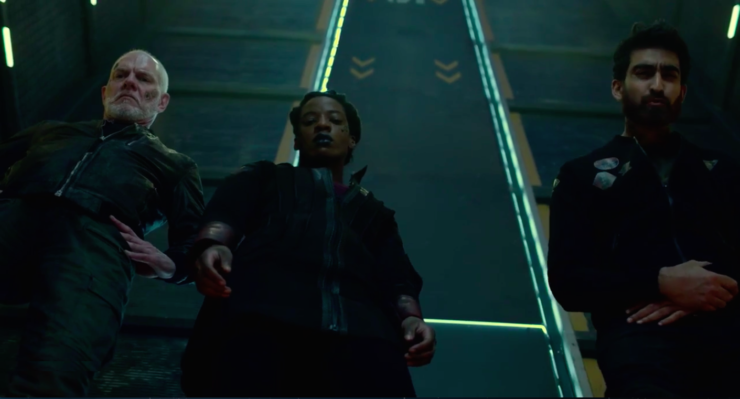First, a confession: I’ve been so engrossed in this season that it took me a long minute to realize that the Ilus scenes are widescreen. It makes so much sense; it’s the first time The Expanse has taken place in wide open spaces. Everyone else is constrained in some way: by the ships of the Belt; by the habitable places on Mars; by the limits of office, in Avasarala’s case. (Not to mention the population density of Earth.) Emphasizing the scope of Ilus, the smallness of this little gaggle of humans contrasted against a planet that appears to them to be “empty,” is a gorgeous choice.
[Spoilers for episodes 3 and 4, “Subduction” and “Retrograde.”]
Episode 3: “Subduction”
Is every episode of this season going to end with the fuckedness quotient leveling up? I know where I’d put my money.
On Earth, Nancy Gao is now running for UN secretary-general. Avasarala is not impressed: “Everybody gets a pony and a blow job. She sounds like she’s running for fucking prom queen.”
But Avasarala’s bluster hides some fear. She’s never had to run for office. She’s risen through the ranks on connections and opportunity—and in a way, the dirt her research team digs up on Gao echoes this. Gao had connections that helped her get off Basic and into the apprentice lottery on her first try. Sometimes, Avasarala notes, people wait decades.
Buy the Book
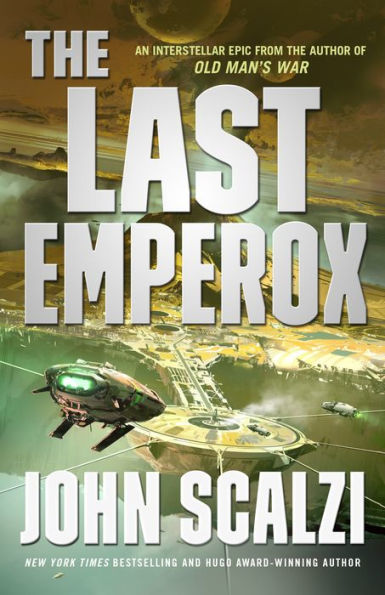

The Last Emperox
Is this the same as being born into a political family? Absolutely not. Will Avasarala use it against Gao, ignoring all the privilege that got Avasarala herself into this position? Absolutely.
It’s so good to get more insight into how things work on Earth in this future. We’ve heard plenty of mentions of Basic over the first three seasons, but never gotten a full sense of what it means for those on it. And it sounds less and less good. If it can take decades to get an apprenticeship position, to have the slightest chance to move yourself up in the world, and that’s the only way off Basic? It’s not enough to let a person live and eat and chase their dreams. Maybe it’s not enough to allow a person to have dreams.
Avasarala hasn’t experienced this. Nancy Gao, whether or not she skipped the line, has. And this ambition for something more, this drive to get out of a limited situation, informs Gao’s desire to see Earthers spread out across the stars. To her, Avasarala might look like an old woman who’s unnecessarily frightened of something that might change lives for the better.
“Whatever is out there, we’ll deal with it, because that is the history of our species,” Gao says, obliviously. What would she think if she knew the whole story? What would anyone think if they knew the story, and how could they be convinced to believe it? She’s absolutely going to appeal to a populace that desperately wants more opportunities, especially given that neither she nor the ordinary citizens of Earth know that those opportunities may not exist.
But what can Avasarala do? Get on TV and explain that an alien being speaks to Holden and the worlds might all be dead and/or deadly? How useful is the truth when no one wants to—or really even can—hear it?
That question haunts every story this season. The truth about Mars is changing, and Bobbie doesn’t want to see it, even as she stumbles deeper into Mars’s underground, where cops are also robbers—robbers who will happily turn around and sell stolen Martian tech to the Belt.
Where the Nancy Gaos of Earth see opportunity past the gates, the Esai Martins of Mars see a different story: the end of Mars. When we first met Bobbie, she was dreaming of the future of Mars, where terraforming makes it green and more habitable. With the gates open, and seemingly livable planets on the other side, what’s the point of all the effort to make one red planet a little better for humans?
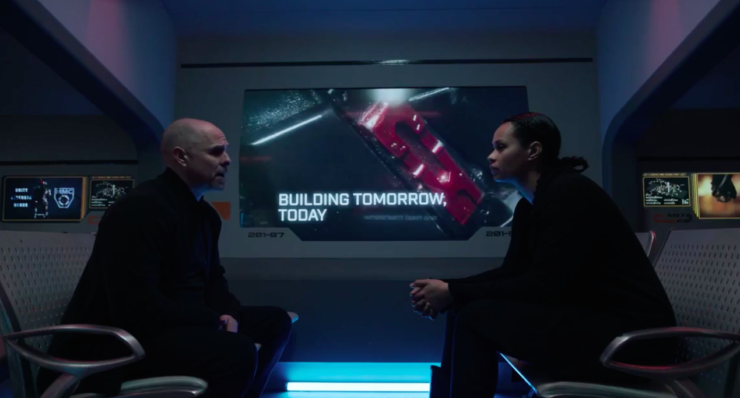
“Look around you. Mars is changing,” says Martin, not unkindly. Martin is a little like Murtry in some ways: he’s using the dissolution of Mars’s future to justify his actions, but he’s mostly an opportunist (if a less prone-to-murder one). Given how Mars has treated Bobbie, he’s right that she doesn’t really owe the planet anything. But that’s not how she sees it—or how she wants to see it. She’s been following her conscience out of love for Mars, and it’s gotten her into more and more trouble. What happens if she switches paths?
Out on Ilus, no one but Holden and his crew knows anything resembling the truth about what’s going on with the planet, and so humanity’s interpersonal wars continue to play out in violent ways. Murtry is cool as a rotten cucumber about his casual murder of Coop, but that problem is maybe less pressing than the lightning crossing the planet (in a straight line!), which is going to hit the camp.
Amos is still slightly drunk, and when he asks, “How do you know where lightning’s gonna strike?” he’s just baffled enough that it’s almost childlike. But when Holden tells him to keep a lid on the situation, he snaps back into action mode: “Ok, you want me to shoot Morty?”
It’s the same solution Murtry would leap to—A problem! I shall murder it—but with a huge difference: Amos checks with Holden first. He doesn’t always go straight to murder; if the problem is a thing he can use his hands to fix, that’s also one of his options. He uses violence tactically, and we’ve never seen any suggestion that he enjoys it. But his willingness to do whatever is necessary leads him to recognize Murtry in a way no one else does:
Amos: The others don’t get it yet, but I know what you are.
Murtry: Oh, and what is that?
Amos: A killer. [Swigs from Murtry’s flask.] You have all the excuses that make you seem right, but the truth is your dick got hard when you smoked that guy in front of everybody and you can’t wait to do it again
Murtry: Speaking from experience?
Amos: Not really. But from one killer to another, you don’t wanna try that shit with my people.
Murtry: Someday I think you and I are going to end up bloody.
Amos: How about now? I’m free right now.
Murtry: [death stare]
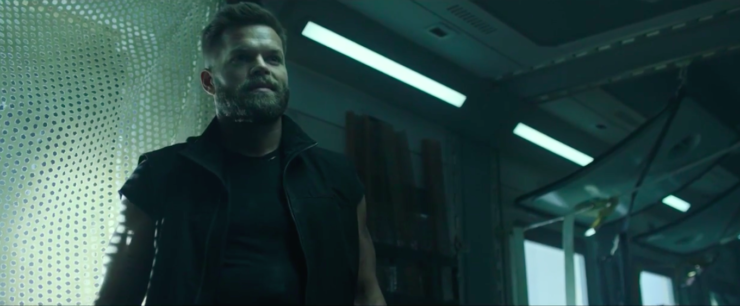
Amos fixes problems, and Murtry is a problem. (You know Amos is serious because he uses Murtry’s actual name.)
Naomi is still hiding the truth of her physical struggle, and it’s so hard to watch her kill herself trying to help. She’s not up for being planetside, and it’s infuriating and unfair; watching her grow angrier and weaker at once hurts. She’s standing in for all the Belters whose bodies won’t respond to gravity drugs, who need to stay in the Belt, in space, to survive. All these new systems might mean opportunity for some, but not for all, and she’s the gasping, struggling embodiment of that.
And then there’s Holden, who has finally—finally!—realized that maybe he and Miller aren’t working toward the same goals. Miller speaks truth; it’s just incomprehensible to Holden, tucked away into Miller’s little fables. And also, Miller has vanished, leaving Holden to try to deal with whatever they just turned on.
He also has to deal with Okoye, who grows suspicious of Holden’s evasiveness and half-truths. She’s a scientist, and she’s growing more and more dogged about understanding what’s really going on here. When she asks Holden, “We are witnessing something that human beings have never seen before, and your first instinct is to destroy it?” she cements their positions as basically the Gao and Avasarala of Ilus. Holden knows so much more than he’s saying, and knows he’s right to be scared; Okoye sees something new, scary but amazing, and sees possibility there.
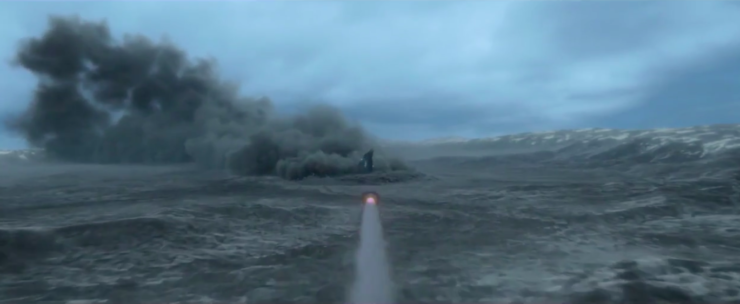
And she asks a very good question: What’s powering it? What else might you be affecting with that torpedo?
Those questions could apply to Murtry’s decision to gas and shoot the rest of the conspiring Belters, too: What was powering their choices? What else might you have set in motion when you decided to kill them? What does it mean to do to these four humans the same thing Holden does to planet-eating alien artifact?
Episode 4: “Retrograde”
In short, everything is on fire, and everyone is still acting like themselves, for better or worse. When Naomi calls Amos and begs him to do something, he throws himself bodily into a whole mess of Murtry’s men. It’s not even a brawl; he’s too outnumbered. His solutions are always physical, and never more than in this scene. Last time he got in a tussle with the security force, Chandra told Amos she’d shoot him if she had to, but this time she yells at everyone else to get off him. Does Murtry think it would be too much trouble to kill Amos because of what Holden would do, or because his second might mutiny? She has a lot of loyalty to Murtry, but it’s starting to fray, and Jess Salgueiro is exceptionally good at showing that strain.
“Retrograde” is so much about loyalty: Chandra Wei’s loyalty to Murtry, being tested by her affection (and understanding) for Amos; OPA loyalties; personal loyalties; loyalty to one’s crew.
Loyalty is a form of personal truth; it doesn’t always make sense to other people. Wei’s loyalty to a stone-cold murderer is baffling—until we find out that she feels she’ll always owe him. Alex’s choice to keep a secret that might kill Naomi is probably hard to understand, if you’re Holden. Naomi’s loyalty to other Belters is part of what makes her help Lucia, even though it further strains her health. Lucia’s loyalty to the idea of the Belter settlement is what led her to work with Coop and the others to destroy the landing pad; it went sideways, and now she has to live with that.
On Ilus, violence continues to beget violence, and the question of the hour (asked by Avasarala and Fayez) is simply, “What the fuck is going on down there?!?” Trying to get Murtry off her trail, Naomi remote-fires the Roci—not to kill him, but to create a clear path for herself and Lucia. This non-deadly choice works much better than most deadly choices we’ve seen. Naomi, at least, seems to have taken some of the lessons of the slow zone to heart.
But Holden hasn’t. His destructive reaction to the alien tech looks, to Okoye, as violent and pointless as Murtry’s tendency to shoot his problems. “You don’t get to kill whoever you want! You are not the law here!” Holden yells at Murtry, right after doing essentially the same thing. It just looks more reasonable to us because we were with him on Eros. We’ve seen the hybrid. We know what he saw in the ring station. Okoye knows only what little of those stories has been on the feeds, and to her, Holden is definitely looking more madman than prophet.
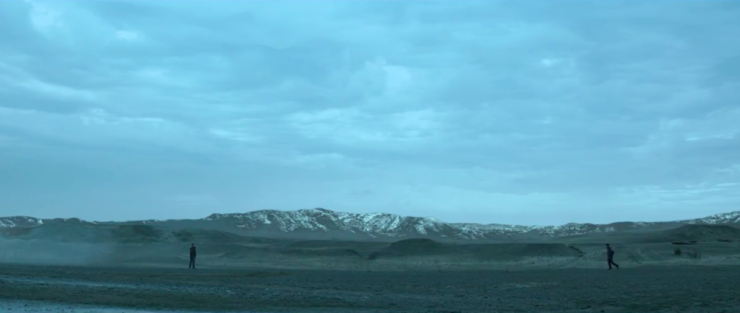
That doesn’t mean I didn’t cheer a little when he stalked up and clocked Murtry. That stunning shot of the two of them on an alien landscape! They look so small, so puny, so out of proportion to everything else on the planet. Considering what Fayez is seeing from space—tremors, moving epicenters, and an entire island chain heating up—this is just the start of their problems.
On Mars, Bobbie is still screwed. Every time she looks to an authority figure for help, they turn out to be just as shifty as Martin. Mars is falling apart around her, and all this opportunism is a symptom. Bobbie’s conversation with the guy who’s into her reveals so much more about that: Bobbie never met anyone who was unemployed—until the war ended. Mars was the opposite of Earth, where there aren’t enough jobs to go around; Mars truly had a part for everyone to play. (“Have faith in Mars. Something will turn up,” the job placement officer tells Bobbie.)
But the tradeoff is, you have to play that part whether you asked for it or not. War and militarism drove their economy, made those jobs, built that society. Do they even know how to stop fighting? Does Bobbie? Her anger at David is understandable, even if he’s a kid: he got involved in drug-making when he didn’t need to, and that’s where all of this started.
Running underneath all of this is a quiet question about the nature of work itself. Is it necessary? Are there other ways to have purpose? How can people with different ideas about work co-exist? How much has Mars internalized Earth’s failure to provide enough meaningful work for those who want it?
Something does turn up, but not the way the placement officer intended. The look on Bobbie’s face when she agrees to work for Martin is one of giving in, but not giving up. It’s not who she is. But she’s run out of options.
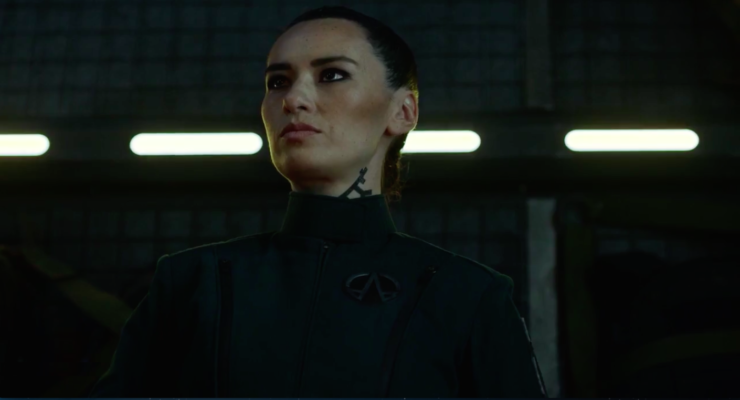
Out in the Belt, a plot thread from Nemesis Games moves to the forefront, giving us a dense knot of Belter politics and a glimpse—if a one-sided glimpse—into Naomi’s past.
I just read Nemesis Games last month, so I’ve definitely got some pre-existing opinions about Marco Inaros, and am 100% on Drummer’s side when she says coldly, “I’m a friend of Naomi Nagata. There’s only one way you’re getting out of here.”
But he’s a fascinating, slippery character, conniving and charismatic, and even if we don’t see all of that on screen immediately, his backstory with Naomi suggests what he’s capable of. Yes, she was younger when they were together, but she’s still incredibly smart and still got drawn into his webs. When he asks Drummer, “What did she tell you?” it’s not because he cares; it’s because he wants to figure out the most effective way to twist Drummer’s existing knowledge for his own gain.
Given Marco’s manipulative tendencies, it’s incredibly satisfying to realize that Drummer and Ashford are playing him. (Ashford’s skepticism about how Marco got caught is deeply warranted.) He talks too much, yes, but if you can sift through his half-truths and bragging, there’s useful information there. Like the locations where people might retaliate if he died—places Ashford now knows to look for rats. Or like his offhand mention of Mars. (If you look closely, one of the OPA ships looks to be Martian salvage.)
Not everything Marco says is wrong, though, and that’s what makes him such an effective threat to everything Drummer and Ashford are trying to build with the truce, and with the Inners. Ashford has a history. The colony ships are full of supplies that would help the Belt. Things have changed on Mars.
But he’s so good at twisting everything into justification for violence. They’ve all killed Inners. They’ve all fought for the Belt. To him, the rings haven’t changed anything: there’s still enough for everyone, and the Inners still won’t share. The Belt has flown out to Ilus to mine, and the Inners want to take that away from them, too. But he still stand down; he will forfeit what remains from the Sojourner “and sit quietly on my hands like a good little boy until the Inners break the treaty, which they will.”
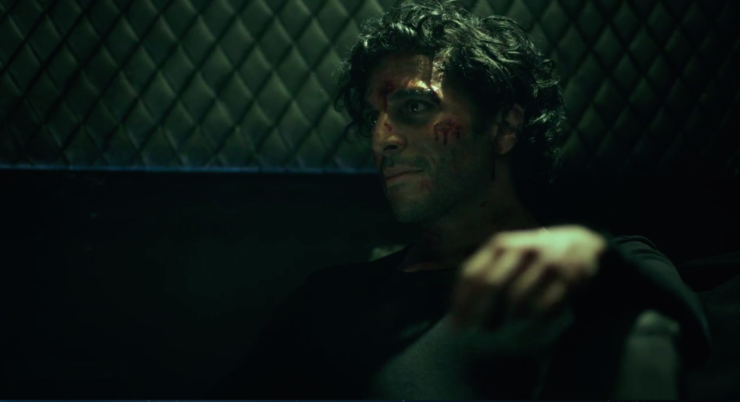
What Marco says isn’t wrong, but the conclusions he draws—more violence, more killing, more destruction—aren’t right. And that’s the problem with people that this season demonstrates so broadly and beautifully: We’re so good at being wrong and right at the same time. We want to protect people and we often do it the wrong way. We’re all ignorant of the myriad ways other people’s lives are difficult. The Inners are ignorant of their relative privilege; the Belters are ignorant of the limitations of life on Basic. Marco can be technically correct and still monstrously wrong, as the bodies of the people from the Sojourner make clear.
Marco talks a good game about his loyalty to the Belt, but it’s a loyalty he uses and performs to justify terrible actions. And the Belt remains divided, as the vote on his fate shows. Drummer’s choice is deeply, carefully calculated. She can’t be the deciding factor in Marco’s death sentence; it would set Medina and Tycho against the other factions. It’s safer to disagree with Ashford (and by extension, Dawes) and, for now, just keep an eye on Marco. Of course he’s planning something. But at least now they know—or think they know—what to watch for.
FLOTSAM AND JETSAM
- The Amos/Murtry staredown in the middle of a dusty, empty town is a thing of gorgeous Western beauty.
- Points to Okoye for telling Fayez, up on the Edward Israel, about Murtry’s murdering; it’ll be good to have people in orbit aware of that situation.
- “So does that mean we’re not fuckin’ anymore?” Amos’s plainspoken desire to just know where he stands is an endless source of delight.
- Why do the crates of Martian tech have light-up numbers! Wouldn’t the batteries die eventually! I don’t know why this bothers me so much!
- The little redheaded kid whose eye hurts is one of those tiny scenes you shouldn’t forget.
- Absolutely love Fayez’s spaceship version of, “Oh, sorry, man, you’re breaking up!”
- I should be counting the number of times someone asks a variant of “What the fuck??!”
- Still not trusting the guy who’s into Bobbie.
- The casual way Ashford says, “Oh, shut your mouth, or I will shut it for you.”
BOOK GEEK OUT
I’m SO GLAD this Okoye isn’t smitten with Holden. That character choice got very grating on the page, and here, giving him a scientist foil who challenges his actions makes so much sense. She wants to understand; she wants knowledge; Holden is constantly keeping it from her. I love her as a thorn in his side.
Ashford references a ship that has no match for its drive signature, which suggests that even more of Nemesis Games is being brought in to this season, and that Bobbie’s plot is going to start overlapping with the Belt before too long. It almost makes me wonder how much of book five we’ll get before the end of this season, and how they’ll structure the next one (which is already underway). That book is so dense with story in so many different places—and it’s going to break my heart to see some of it on screen.
Do we all have questions about Marco Inaros? His goals here seem different than in the book; he tells Ashford the new systems should belong to Belters, not (as his book counterpart claims) that they should blow up the rings before Belters become Inners. His fears on the page are more like what we’re seeing happen to Mars: that the new systems render the Belt unnecessary; that their way of life will disappear. I’m so curious how that’s going to play out.
Molly Templeton has been a bookseller, an alt-weekly editor, and assistant managing editor of Tor.com, among other things. She now lives and writes in Oregon, and spends as much time as possible in the woods. You can also find her on Twitter.










